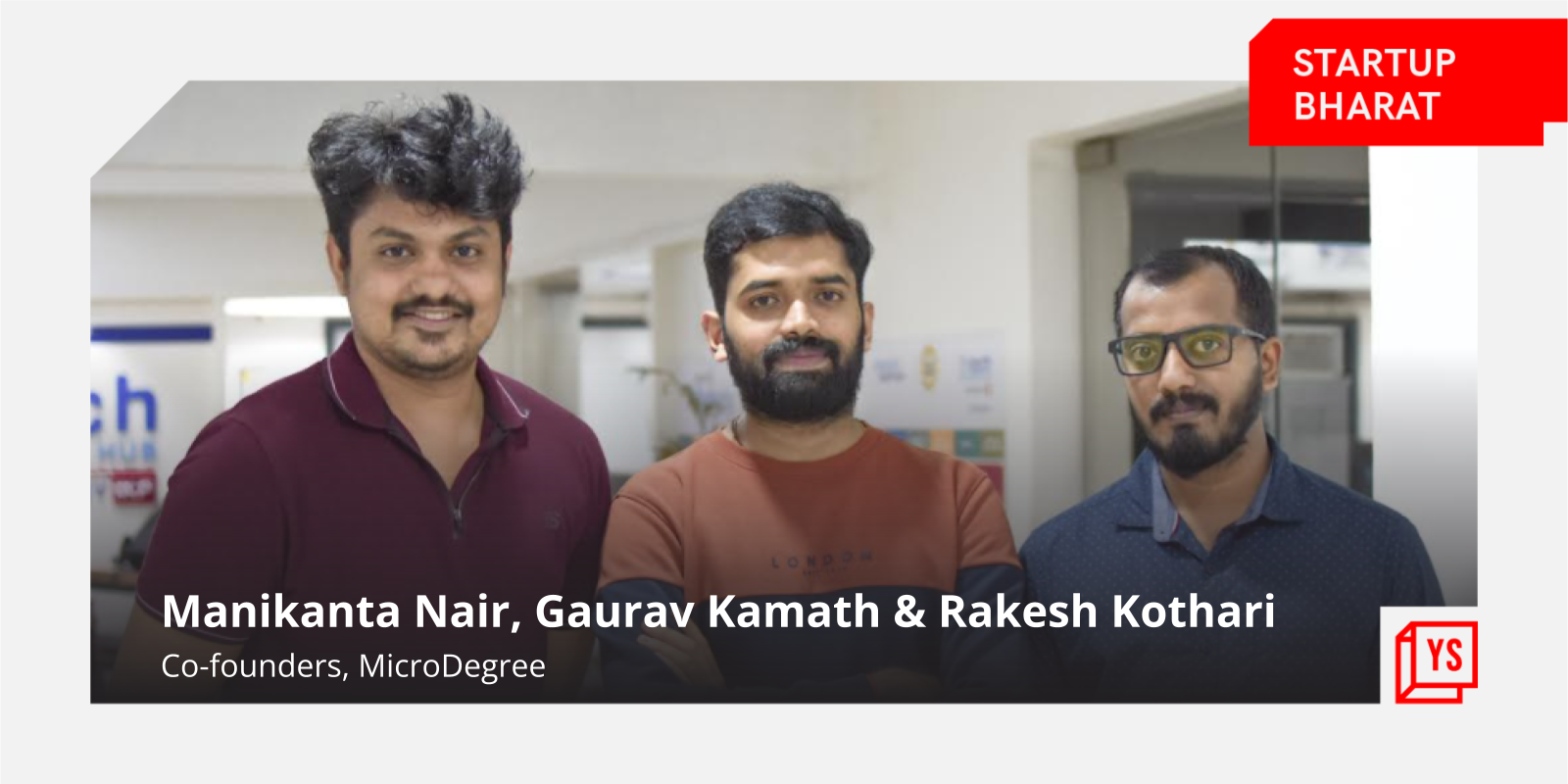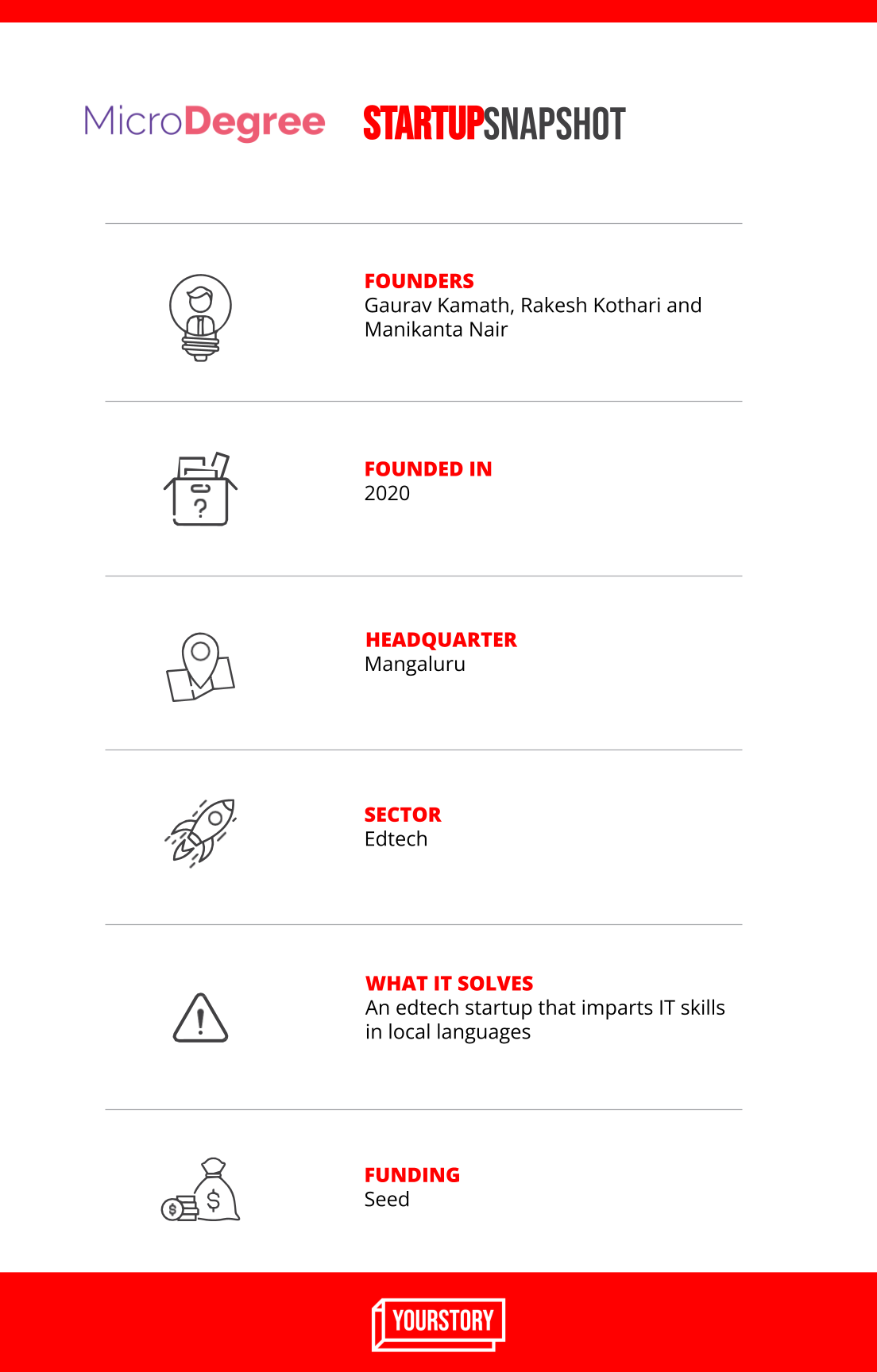India is home to several lakh engineers. While they come from all nooks and corners of the country, their inability to be fluent in English has been a barrier in their engineering journey.
Mangaluru-based MicroDegree aims to help students from Tier – II, III, and beyond cities learn coding in vernacular languages and job-ready skills with its online programmes.
Founded by Gaurav Kamath, Rakesh Kothari, and Manikanta Nair in 2020, the edtech startup aims to make emerging tech affordable for students irrespective of their educational backgrounds and languages.

“At present, we teach IT skills like cloud computing, Python, and other job-ready skills in Kannada. The programmes run for about two months, where classes are conducted either on weekdays or weekends in morning/evening batches. Enrollees also get access to recordings of live courses, which helps in case they miss classes,” Gaurav, Co-founder and CEO, tells YourStory.
The USP
MicroDegree’s trainers are certified industry leaders in their specific tech domain. The startup’s pedagogy focuses on hands-on training with real-time relatable, intuitive, and easy-to-grasp examples.
By next financial year, MicroDegree is aspiring to enter Hindi, Tamil, Telugu, Marathi and Bengali languages.
Gaurav explains, “Our USP is vernacular delivery with the local context. When we say we teach in Kannada, people get confused — how can we teach technology in a local language? While the concepts are easily explained in Kannada, all other tech terms are still in English. It's more like a 60-40 percent mix of the languages.”
He adds, “The whole idea is to have the experience of a friend teaching me during exams. He teaches the same things the lecturer taught in English. But since he explains in Kannada with a local context, I can understand easily and retain better.”
MicroDegree’s founders met through CEOL — Incubation Centre Mangaluru, funded by Finance Minister Nirmala Sitharaman’s MPLADs funds.
“We were running our own startups, which failed. That's when we met together and thought of solving the challenge of upskilling local talent in local languages,” Gaurav says.
MicroDegree, available across Karnataka, has a team of 20+ members. It is looking to become a 200+ strong team in the next six months.
Funding and monetisation
MicroDegree was selected as the top 100 startups under the Karnataka government’s flagship Elevate programme in March 2020. It also received undisclosed seed funding from 100X.VC and Somaiya Vidyavihar's incubator Research Innovation Incubation Design Labs (RIIDL).
“With the surge in demand we are seeing in recent days, we will be starting the process to raise the next round soon,” Gaurav adds.
The startup charges a one-time price for its course. It plans to launch a subscription option too. “Revenue wise, we are growing at 50 percent monthly and have already seen a 10X revenue growth over last fiscal,” he adds.
With Rs 1 crore revenue generation in FY21, the startup claims to reach Rs 15 crore in FY22 as it enters five new vernacular markets.

The way ahead
According to an Omidyar and Redseer report, the post-K12 Indian edtech market is expected to reach over $1.75 billion in 2022.
“With the target being the next half billion users for Bharat, we believe there is no entry barrier in education. Sticking to the fundamentals to provide world-class training should be the focus,” Gaurav explains.
MicroDegree started with an investment of Rs 100. The co-founders printed pamphlets and shared them across colleges. The startup received 50+ paid users who were interested to learn full-stack development.
“Since we had a technically strong founding team, we ran an offline cohort from the revenue generated on a pilot basis,” he adds.
MicroDegree has a learner base of over 10,000, most of whom are from top cities and Tier II and III towns. Its Android app has more than 3,000 downloads and the startup expects to launch a renewed app next month to grow further.
Gaurav says, “Our learners are mainly working professionals who want to upskill and are looking to move to higher-paying roles. We also have freshers joining our courses, whom we prepare for new-age jobs.”
The edtech startup aims to aid in providing five lakh jobs in the next three years.
It competes with the likes of Edureka, Intellipaat, and local unorganised training institutes in India. Globally, it competes with Simplilearn, Udemy, and Coursera, among others.
Edited by Suman Singh

